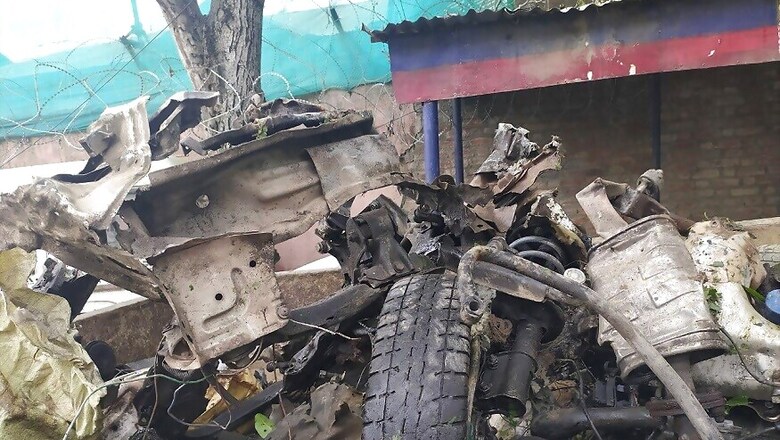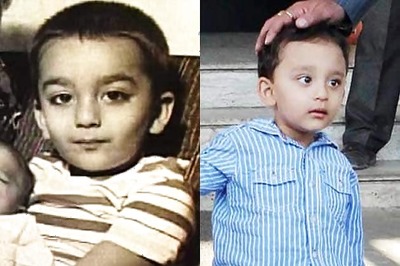
views
As police and intelligence services conduct a region-wide hunt targeting Adil Ahmad Hafiz—suspected by authorities of being the suicide-attacker tasked with driving the car-bomb found near southern Kashmir’s Pulwama on Wednesday night to its target—his older brother has issued an emotional appeal for the fugitive to terminate his mission and surrender.
“Please come home quickly,” Ejaz Ahmad says in a video obtained by News18. “Your parents are waiting for you. If it’s paradise you want to go to, the path lies through your parents. Leave this path you are walking on,” he urges, adding, “Every problem can be solved through discussion”.
“There is no point to sacrificing your life for people want to eat India’s rice and Pakistan’s salt,” Ahmad says in the video clip.
Police in Kashmir, government sources said, are hunting for a second car-bomb packed with explosives, believed to have been assembled by the same Jaish-e-Muhammad cell that fabricated the device found in Pulwama on Wednesday night.
Security forces had prevented a massive car bomb attack after they stopped a vehicle carrying 40-45 kg of improvised explosive device (IED). The plan had chilling similarities with last year's terror attack in Pulwama, when over 40 soldiers were killed.
“The chances are Adil Hafiz will attempt to use this second car-bomb to complete his mission,” a senior intelligence official said. “Every effort is being made to locate him before that happens”.
Local Terror Recruitment
Born in 1999 in the small village of Larve Kakpora, near south Kashmir’s Pulwama, Hafiz is part of a new cohort of Kashmiri militants who have begun volunteering for suicide-missions with terrorist groups like the Jaish-e-Muhammad and Lashkar-e-Taiba—a stark departure from an earlier generation who rarely volunteered for these roles.
Educated at the local school in Larve, he began studying for a Bachelor of Sciences degree at college in Pulwama. In November, 2019, though, he dropped out of college and joined the Hizb-ul-Mujahideen. The family, police sources say, made several efforts to have their son return home, before formally filing a complaint with police in March, 2020.
Later, the Jammu and Kashmir police believe, Adil Hafiz worked for Lashkar-e-Taiba cells active in southern Kashmir, before finally volunteering for this suicide mission.
Kashmir-zone Inspector-General of Police Vijay Kumar told Network 18 that police had been searching for the cell responsible for building the car-bomb found in Pulwama for over a month. “From a variety of sources”, Kumar said, “we’re confident that the target was a security force convoy. The consequences could have been horrific”.
In February, 2019, a Jaish-e-Muhammad suicide bomber had struck a Central Reserve Police Force convoy at Leithpora, near Pulwama, killing 40 police personnel.
Prime Minister Narendra Modi had responded by ordering the Indian Air Force to bomb a Jaish-e-Muhammad seminary at Balakot, in Pakistan’s Khyber-Pakhtunkhwa province, sparking off the first air-battles between the two countries since the war of 1971.
“Lots of people in the Indian security establishment believed Pakistan had been deterred by the crisis from further large-scale terrorist attacks in Kashmir,” a senior Indian intelligence official said. “The Pulwama suicide-bombing plot suggests otherwise”.
New Jaish Commander
The latest Pulwama plot, police and intelligence services in Kashmir believe, accelerated early this year, after the arrival of a new Jaish-e-Muhammad operations chief, known to Indian authorities by the pseudonym Abdullah Rashid Ghazi. Ghazi is thought to have crossed the Line of Control in Poonch along with several other Jaish-e-Muhammad terrorists early this year.
From his base in the mountains above Pulwama, intelligence sources said, Ghazi issued instructions to a Jaish-e-Muhammad bomb-maker in the Kulgam area—known to intelligence services only by the nickname ‘Lambu’, or ‘tall guy’—to fabricate two car bombs, including the one found on Wednesday.
The bombs, investigators believe, were from locally-sourced ammonium nitrate—a common fertiliser—mixed with fuel.
Even though the Jaish-e-Muhammad has carried out dozens of suicide-attacks in Kashmir, ethnic Kashmiris played a marginal role in these operations until 2017. Barring the May 2000, car-bomb strike on the XV Corps’ headquarters in Srinagar, carried out by high-school student Afaq Ahmed Shah, state residents were not known to have carried out any suicide attacks.
The murderous street battles between police and protestors which began in 2008, though, saw ethnic Kashmiris becoming increasingly active in the Jaish-e-Muhammad and Lashkar-e-Taiba. In December, 2017, teenager Fardeen Khandey and 21-year-old Manzoor Baba participated in a suicide-squad attack on a Central Reserve Police Force complex in Pulwama, the first known ethnic Kashmiris to have carried out such an operation.
Following the Islamist-led insurrection of 2018—which saw the state apparatus disintegrate across south Kashmir—ethnic Kashmiri participation in suicide attacks have seen a steady uptick, helped along by Inter Service Intelligence Directorate pressure on terror groups to put daylight between their operations and Pakistan.
Adil Dar, the 20-year-old who carried out the 2019 suicide-bombing in Pulwama, was among this new cohort of volunteers. “By the time this video reaches you,” he said in a suicide video, “I will be frolicking in paradise”.
“The Jaish has kept the flame of jihad alive here even in the most difficult circumstance. Come, join the group and prepare for the last fight,” he said.
The son of a small businessman who radicalised amidst street battles with police in 2016, Dar had dropped out of high school in 2017 and began work at a sawmill. In 2018, he was reported missing by his parents, and listed in police records as having joined the separatist movement.
“Lots of the new jihadists have the much the same profile”, said Inspector-General of Police Vijay Kumar. “They’re mostly semi-educated, with few economic prospects, and are often drawn to religious extremism and then terrorism because it gives them some sense of purpose and meaning in their lives”. “Their frustrations and resentments are easily exploited by jihadist groups”, he added.




















Comments
0 comment